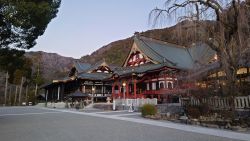
Originally published on metropolis.co.jp on September 2010
Brave new world
- A survey of 300 Japanese iPad users by research company Macromill Inc. found that 20 percent of them had digitized their own books.
- The editors at the Oxford English Dictionary added the word hikikomori to the reference work’s third edition.
- An agriculture ministry survey found that the number of people who became farmers last year shot up by some 11 percent, as did the number of people taking over farms from elderly relatives.
- Researchers at the University of Tokyo have found that beni-zuwaigani crabs like to cluster around sea vents that emit a compound called methane hydrate. The researchers added that this substance is “a possible next-generation fuel that has a sherbet-like consistency.”
You don’t say
- The Japan Society of Human Genetics has warned consumers that internet-based companies offering genetic testing services are potentially “dubious.”
- A 40-year-old Tokyo man who swam the 25km Fehmarn Belt Strait between Germany and Denmark said, “It was really cold.”
- At a political seminar in Tokyo, DPJ honcho Ichiro Ozawa was quoted as saying, “I don’t think Americans are smart… I like Americans, but they are somewhat monocellular.”
- Headline of the Week: “Saudi Women Love Low-Calorie Snacks, Hate ‘Konnyaku’ Jelly” (via The Asahi Shimbun)
Falling short
- Residents in Hakodate demanded that a seafood company remove a 6.3m-tall replica of the Statue of Liberty it had erected on a local hilltop because it clashed with other landmarks including an Eastern Orthodox church and the boarding point for a ropeway.
- A 49-year-old cop in Fukuoka Prefecture resigned rather than accept a pay cut for passing a note from a jailed man to the man’s wife.
- A 16-year-old girl who apparently didn’t want to return to school after summer vacation set fire to her parents’ home in Shinagawa because they scolded her.
Milestones
- Kyoto’s famed Shijo Kawaramachi Hankyu department store shut down after 34 years. The space will be taken over by Marui.
- Actress Misako Konno celebrated her 12th year as UN Development Program goodwill ambassador, making her the longest-serving of seven such representatives around the world.
- Nippon Professional Baseball said that it would standardize the balls used by all 12 teams in the league. Previously, each team has had an independent contract with individual suppliers.
- Two Japanese youngsters aged 8 and 11 took home top prizes at an international competition for Tomy Co.’s Beyblade spinning top toy in Seoul.
The name’s the thing

Illustration by James Brown
- It was reported that a chamber of commerce in Hitachi City, Ibaraki is collaborating with local fishermen to market previously unwanted seafood as “hidden local fish.”
- A gardening company in Hyogo is selling dirt exactly like the soil found at Koshien Stadium, site of the celebrated annual summer baseball tournament.
- Researchers from the Japan Agency for Marine-Earth Science and Technology have invented a seismograph that can withstand such high atmospheric pressure that it can be placed at the bottom of the Mariana Trench.
- After coming in for criticism, Studio Ghibli announced that it would close a souvenir shop called Donguri Kyowakoku (“Acorn Republic”), which it operated inside the PR facility at a nuclear power plant in Fukushima.
Here & There
- A Delta Airlines flight to Seattle had to turn back to Kansai after five of its six lavatories stopped functioning.
- A university study found that college graduates with science degrees earn, on average, ¥1 million more than their humanities-degree-holding counterparts.
- The National Police Agency reported that over 600 crimes against children were perpetrated through the use of social networking websites, including five rapes and one kidnapping.
- An intellectual property court ruled that Sony must pay a former employee ¥5.1 million for his work on developing “a small optical pickup used to play and record data” for the PlayStation.
- Sentence of the Week: “The Osaka District Court on Aug. 24 ordered a 63-year-old woman to pay ¥1 million in damages to her 72-year-old male next-door neighbor after years of bothering him with noise by hitting futons.” (via The Mainichi Daily News)
Tech crunch
- It’s estimated that 500,000 PCs used by local governments and businesses in Japan still run on Windows 2000, which Microsoft stopped providing support for in mid-July.
- Researchers at NTT Communications and Kitasato University have developed a way of IDing computer users based on their typing habits.
- A newspaper poll found that 57 percent of Japanese corporate workers object to making English their official workplace language.
- The education ministry revealed that 3,134 public schools around the nation were shut down between 2002-2008 due to a decline in the number of students.
It’s a jungle out there
- Researchers at Ehime University discovered high levels of fireproofing agents used in consumer appliances in the dead bodies of goshawks and other endangered raptor species.
- Talk about irreconcilable differences. A 44-year-old Shizuoka man was charged with killing an ex-girlfriend while in custody for the murder of his wife.
- The Hokkaido Prefectural Government launched boxed lunch day, to take place on the 11th of each month, in an effort to encourage workers to buy local foods.
- It was reported that the parents of 34 children around the country rejected last year’s government-issued child allowances, which were happily taken back as “donations” by 14 city and ward offices.
Compiled from reports by Bloomberg, BBC, Japan Today, The Japan Times, International Herald Tribune/The Asahi Shimbun, The Mainichi Daily News, The Tokyo Reporter, The Daily Yomiuri, AP and Kyodo







